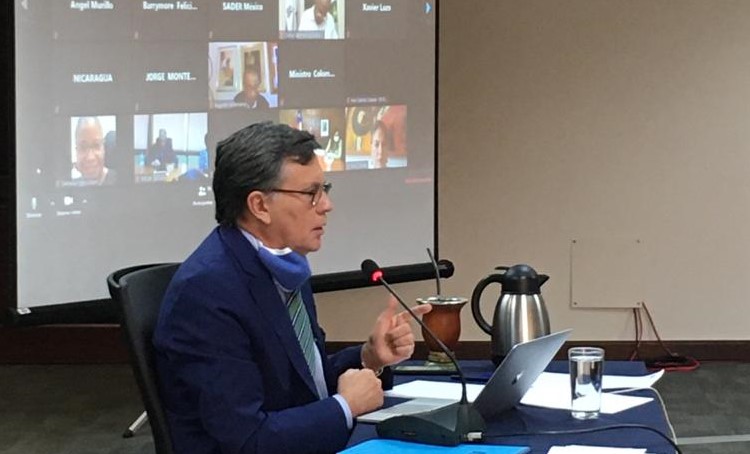FAO and IICA facilitated an unprecedented hemispheric meeting to strengthen the response of 34 countries in the Americas to the COVID-19 pandemic.

22 April de 2020, Santiago de Chile – Ministers and Secretaries of Agriculture of 34 countries in the Americas met virtually wednesday to share their policies, actions and plans to deal with the impact of the COVID-19 pandemic on the food security of their populations, as well as on agriculture, food systems and the rural environment.
Government authorities from North America, South America, Central America and the Caribbean shared their experiences and the measures that they are implementing to guarantee food production and supply.
The ministers highlighted the importance of food being available at reasonable prices, and that its production, distribution and sale be carried out with as little risk as possible to those involved in the food chain. They also underscored the need to promote intra-regional food trade.
The unprecedented Hemispheric Meeting of Ministers and Secretaries of Agriculture was organized by the Inter-American Institute for Cooperation on Agriculture (IICA) and the Food and Agriculture Organization of the United Nations (FAO) in response to a request from the Minister of Agriculture of Chile.
“FAO and IICA have quite a relevant role to play and tremendous experience in order to better coordinate the efforts that we have to make with respect to food supply for our citizens” stated Antonio Walker, Minister of Agriculture of Chile.
“International cooperation is one of the main tools that we have to deal with the effects of the pandemic; no country by itself can guarantee food for its population”, remarked Julio Berdegué, Regional Representative of FAO for Latin America and the Caribbean: “This crisis is teaching us that we need to speed up transformation of the food systems to make them more resilient, inclusive and sustainable”.
According to Manuel Otero, Director General of the Inter-American Institute for Cooperation on Agriculture (IICA), “this hemispheric meeting is a sign of the times to come, of cooperation, complementarity and joint efforts. They will require policies, more innovative States and more flexible institutions. The traditional moulds have been broken. Now more than ever, we need greater cooperation to ensure better public policies that are solid, for a sector such as agriculture which is strategic for keeping the world going”.
Measures undertaken by the countries
The Secretary of Agriculture and Rural Development of Mexico, Víctor Villalobos, highlighted the importance of avoiding unilateral actions that might affect the flow of food, of putting in place all the necessary sanitary measures and establishing international and inter-regional channels for trade in food. Villalobos also suggested to the 34 countries that they create a joint task force to deal with both the pandemic and the post-pandemic period. The Representative of FAO and the Director General of IICA both supported the proposal and indicated that their institutions could facilitate the work of such a team.
Antonio Walker, Minister of Agriculture of Chile, pointed out that the Southern Agricultural Council (CAS) was focused on maintaining food supply, open and transparent international markets, on reducing the urban-rural territorial gaps, and on carrying out an analysis of how to deal with the post-pandemic situation. The minister underscored the importance of rural family farming within this scenario and the need to share sanitary protocols that cover the entire food chain.
Mauricio Guevara, Secretary of Agriculture and Livestock of Honduras, explained that the Central American Agricultural Council (CAC) was conducting a survey to determine exactly which foods were available in each country, what are the excesses as well as the needs.
Saboto Caesar, Minister of Agriculture, Industry, Forestry, Fisheries and Rural Transformation of Saint Vincent and the Grenadines, spoke on behalf of the Caribbean Community (CARICOM): “We are experiencing a disruption in trade in basic agricultural products at the CARICOM level due to disruptions in the food and inputs supply chain”. He also underscored governmental support to provide elements of protection to farmers, technical assistance to the countries, the increase in trade between the CARICOM countries, and South-South cooperation between CARICOM and South America with respect to the food trade.
The Minister of Agriculture and Livestock of Ecuador, Xavier Lazo, representing the Andean countries, indicated that many small farmers had begun to use technology platforms in order to reach persons more directly, even supplying food to homes directly.
“The agrifood chains are fundamental to maintaining employment and will be the driving forces behind rapid post-crisis rehabilitation”, explained Tereza Cristina Corrêa, Minister of Agriculture, Livestock and Food Supply of Brazil: “Free and fair trade is the key to providing food, especially in the poorest regions of the world”. The Minister also underscored the importance of family farming.
The Under-Secretary of Agriculture for Trade and Foreign Agricultural Affairs of the United States, Ted McKinney, highlighted the importance of promoting innovation to increase food production, and congratulated both institutions on the organization of the ministerial meeting.
Also participating in the meeting were regional authorities and experts from the Inter-American Development Bank (IADB), the Central American Bank for Economic Integration (CABEI), The Caribbean Research and Development Institute (CARDI), the Caribbean Agricultural Health and Food Safety Agency (CAHFSA), the Development bank of Latin America (CAF), the Inter-American Commission of Women (CIM), the Economic Commission for Latin America and the Caribbean (ECLAC), the Caribbean Community (CARICOM), the International Fund for Agricultural Development (IFAD), the World Organization for Animal Health (OIE), the International Regional Organization for Plant and Animal Health (OIRSA) and the World Food Program (WFP).
More information:
Institutional Communication Division
comunicacion.institucional@iica.int











